What Is Censorship, Really?
Last week I posted about Section 230 and tech censorship 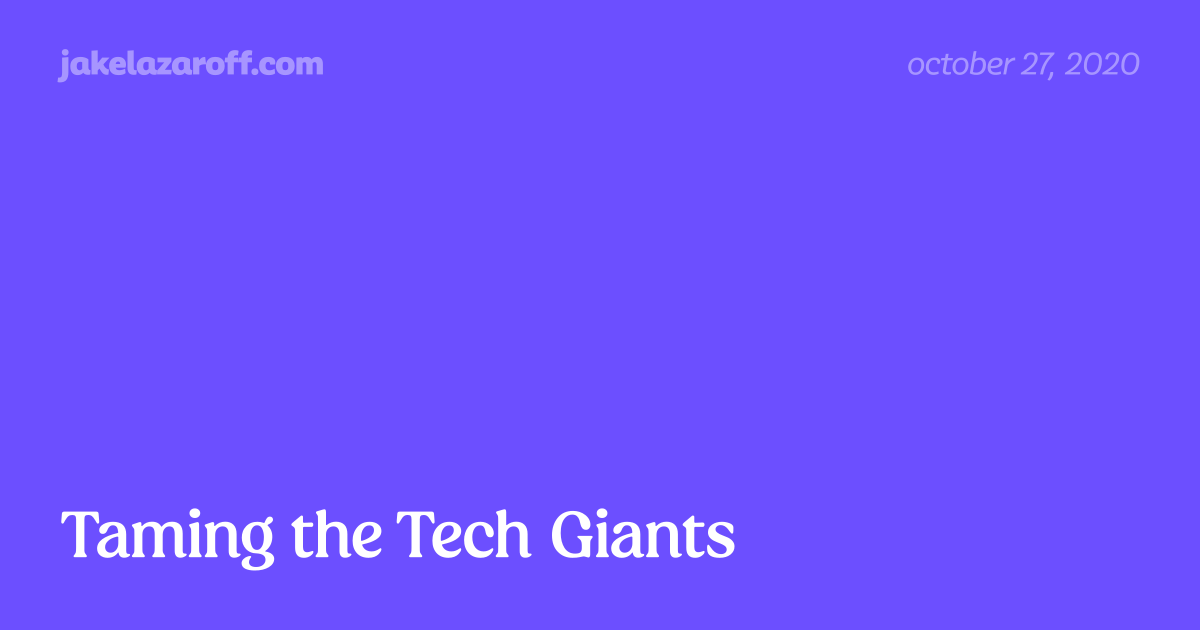 Taming the Tech Giants | jakelazaroff.com The web was built with the promise of giving everyone a voice. We keep that promise not by forcing gatekeepers to play fair, but by getting rid of them entirely.
Taming the Tech Giants | jakelazaroff.com The web was built with the promise of giving everyone a voice. We keep that promise not by forcing gatekeepers to play fair, but by getting rid of them entirely. jakelazaroff.com/words/taming-the-tech-giants/ . A couple days later, Glenn Greenwald was censored by his editors at The Intercept
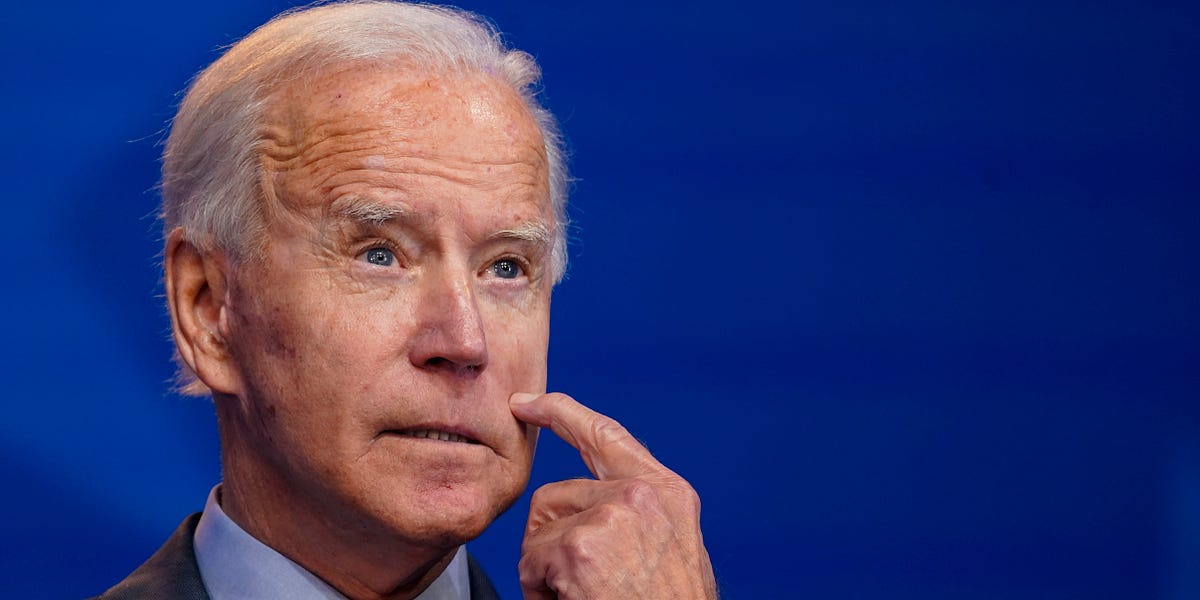 My Resignation From The Intercept The same trends of repression, censorship and ideological homogeneity plaguing the national press generally have engulfed the media outlet I co-founded, culminating in censorship of my own articles.
My Resignation From The Intercept The same trends of repression, censorship and ideological homogeneity plaguing the national press generally have engulfed the media outlet I co-founded, culminating in censorship of my own articles. greenwald.substack.com/p/my-resignation-from-the-intercept . What timing!
The tale goes: Greenwald submitted a draft of an article about mainstream media and tech collusion to suppress the New York Post story on Hunter Biden’s emails. Component to that was an overview of why the emails were actually plausible — not just disinformation, as most big publishers claimed. The editors at The Intercept asked that Greenwald remove the parts of his article which asserted the plausibility of the emails, and instead focus on the media’s failure to question the Biden campaign. This was a bridge too far for Greenwald, who accused the editors of censoring him and said he’d seek to publish the story elsewhere; they encouraged him not to and published a scathing response  Glenn Greenwald Resigns From The Intercept Greenwald’s decision stems from a fundamental disagreement over the role of editors and the nature of censorship.
Glenn Greenwald Resigns From The Intercept Greenwald’s decision stems from a fundamental disagreement over the role of editors and the nature of censorship. theintercept.com/2020/10/29/glenn-greenwald-resigns-the-intercept/ .
The issue at hand is an editorial decision of The Intercept about a piece written by one of their staff writers, so Section 230 doesn’t apply here. The question of online censorship in general, though, is very relevant. When I wrote last week, I advocated breaking up tech giants as a way to fight censorship online.
Maybe you can see where I’m going with this. But before we get there, let’s take a quick detour through more philosophical terrain: what is censorship, really?
Any online discussion about free speech in the US inevitably draws people reminding you that the First Amendment only keeps the government from persecuting you for what you say 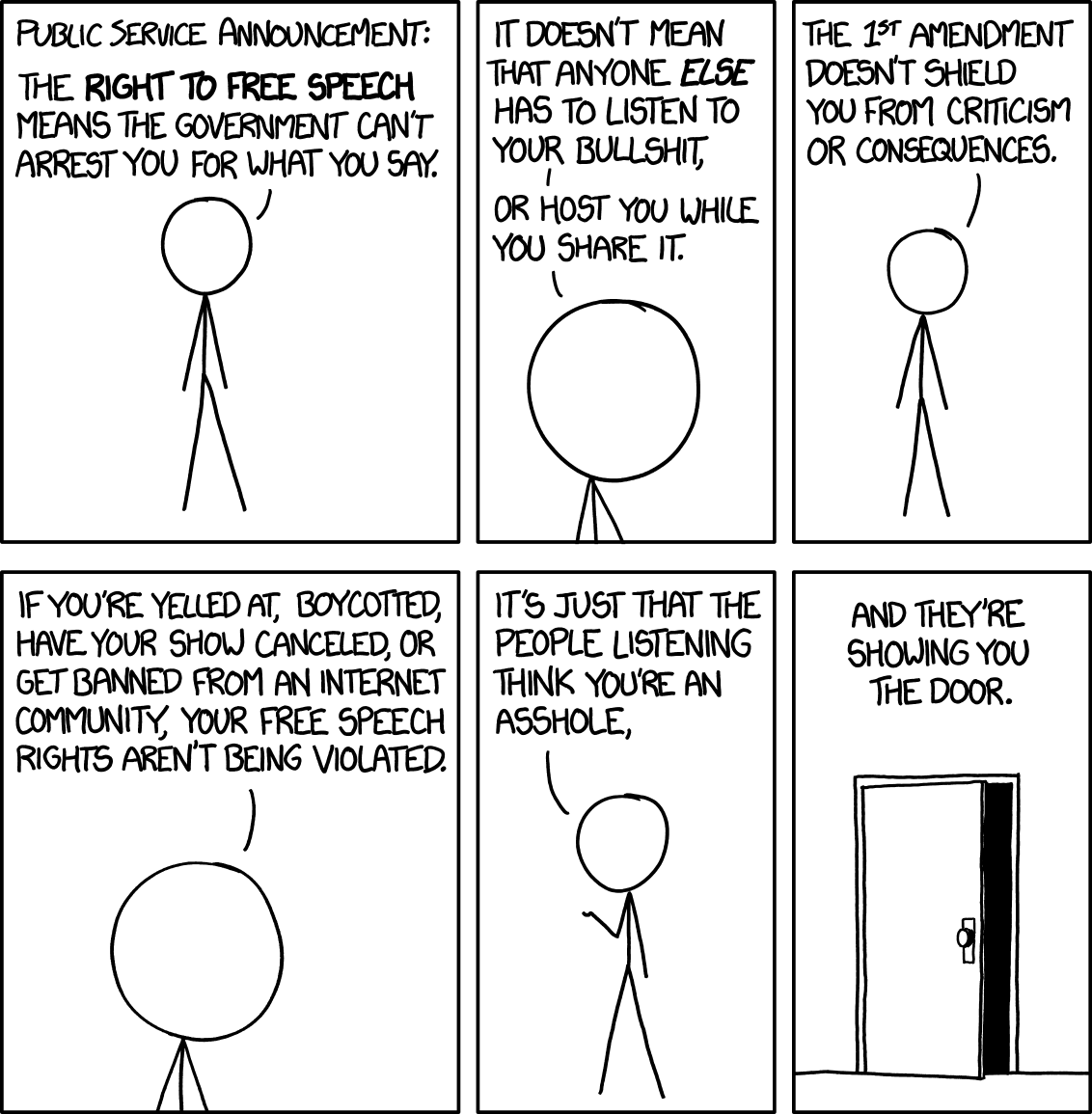 Free Speech
Free Speech xkcd.com/1357/ , whereas private entities are free to respond as they please. It’s true, but it’s also kind of pedantic — in practice, people would like to be able to speak their minds without being ostracized for it, even if the audience disagrees with what they have to say.
That said, even within the bounds of legal speech, no one is a free speech absolutist. Most everyone can agree, for example, that a group of people would be justified in ejecting someone who constantly insults other members of the group. And it’s not just “uncivil” speech that deserves this treatment — someone who nicely expresses support of Hitler probably isn’t getting invited back to next year’s seder.
Cases like the latter one tend to draw virulent reactions. Because it’s not just Jews that have a problem with Nazis: with few exceptions, we’ve all basically decided that Nazis are cartoon supervillains,1 and we make an exception to our normal tolerance of other people.
We do this because the Nazism is bad, in a visceral way. When we come across the viewpoint, we reflexively discard it, and consider anyone who holds it to be suspicious. This is reinforced by a popular culture in which Nazis are always the bad guys. Every war movie, book and video game portrays them as the ultimate enemy. You would be hard pressed to write an article in defense of Nazism and find a major outlet in which to publish it.
For most of us, the idea of supporting Nazism is unimaginable. Those who do support it generally do it covertly, in small groups of known sympathizers, resorting to pseudonyms and dog whistles when doing it in public.
That is what true censorship looks like. To be unthinkable — not necessarily that no one is aware of an idea, but that its antithesis is so thoroughly lodged in our collective subconscious that the idea itself seems like some sort of logical fallacy. For an entire society to be almost unanimously united against a concept, to the extent where it doesn’t even register as a valid point of view.
Nazism is obviously an extreme example, but there are plenty of ideas subject to censorship. Communism is too, because of lingering feelings from the Cold War — although the stigma is beginning to erode on the left. Incest and pedophilia are as well. And it’s not just “bad” things, either: since the ESRB was established in 1994, there have been fewer than 30 games rated AO 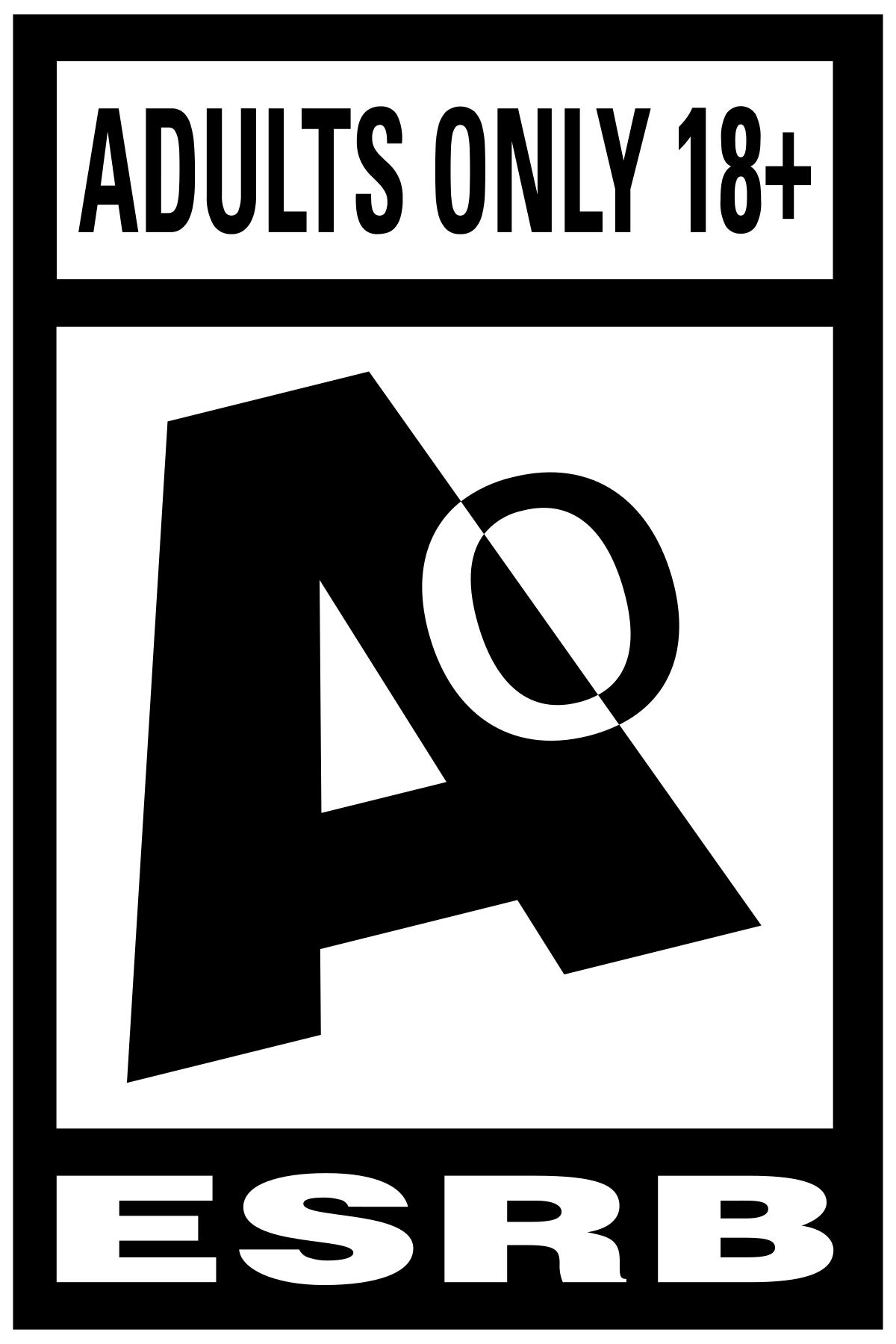 List of AO-rated video games - Wikipedia
List of AO-rated video games - Wikipedia en.wikipedia.org/wiki/List_of_AO-rated_video_games (read: containing sex). Despite sex being a universal human activity, we’ve almost entirely erased it from one of the most popular art forms in the world.
Back to Glenn Greenwald, whose article is being censored because The Intercept wanted to remove a few paragraphs before publishing it.
His may very well be an unpopular opinion among most of the mainstream press. But it’s a fairly popular one across the US as a whole. A quick search on Twitter will reveal millions of people who are keenly interested in the Hunter Biden allegations being investigated and publicized.
It’s also disingenuous to say that even the mainstream media was united against the story. The allegations were initially made by the fourth most circulated newspaper in the country  List of newspapers in the United States - Wikipedia
List of newspapers in the United States - Wikipedia en.wikipedia.org/wiki/List_of_newspapers_in_the_United_States#Top_10_newspapers_by_circulation . After publishing his intent to resign from The Intercept, Greenwald was given an opportunity to speak about it on the highest rated cable news show in the country
 Tucker Carlson: Mainstream media's Hunter Biden lies have consequences. Ask Glenn Greenwald When all the news you receive is manufactured propaganda, you are apt to believe it, and why wouldn't you?
Tucker Carlson: Mainstream media's Hunter Biden lies have consequences. Ask Glenn Greenwald When all the news you receive is manufactured propaganda, you are apt to believe it, and why wouldn't you? www.foxnews.com/opinion/tucker-carlson-hunter-biden-media-lies-glenn-greenwald . The entire saga — from the initial New York Post story to Greenwald’s resignation — has received wall-to-wall coverage from conservative leaning publications.
By any reasonable definition of the word, there’s no censorship here. The Intercept is making an editorial decision that Greenwald doesn’t like. But he’s clearly not prevented from speaking — one of the first articles he published on his newsletter was the draft he had sent to his editors at The Intercept — nor is he receiving universal condemnation or pushback.
It’s a particularly bad faith argument coming from Greenwald, because he knows exactly what censorship is. The defining story of his career was the NSA document leak by Edward Snowden, who has sought asylum in Moscow since 2013 for fear of political persecution. That is real censorship: the kind that makes all but a few brave souls stay quiet about injustice, because to speak up means risking prosecution and death.
I’m sure Edward Snowden wishes he could have just started a newsletter.
The thesis of my post on Section 230 was that the only way to fight censorship is to destroy the monopoly of information gatekeepers. Frankly, there is no monopoly here. The Intercept is one of hundreds of online publications, many of which are sympathetic to the points Greenwald is making. He could easily pack up and move to another platform on which is writing would be welcome. And lo, he’s done exactly that: his Substack newsletter is one of the top ten paid newsletters on the platform, grossing between $300,000 and $400,000 in subscriptions 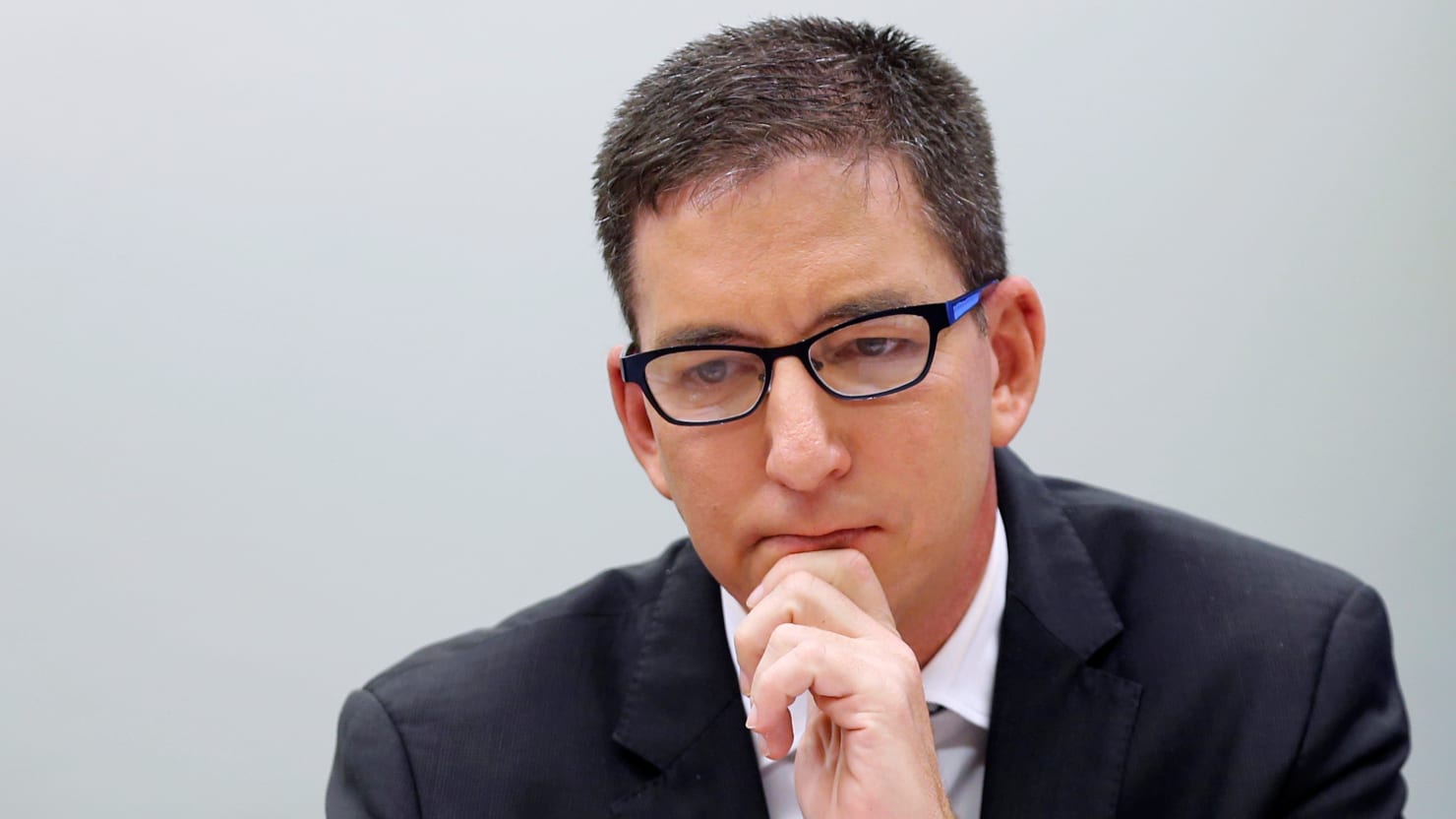
www.thedailybeast.com/intercept-staffers-roll-their-eyes-over-glenn-greenwalds-censorship-claim .2
Impressive as those numbers are, they’re a significant cut from his $500,000 salary at The Intercept, and I imagine his readership will drop correspondingly. This, I think, gets to the core of what Glenn means by censorship. He is being prevented from saying what he wants to the largest possible audience.
Greenwald’s delusion is a pervasive one among successful writers: that any pushback they receive is illiberal. It’s why the infamous Harpers Letter wails that “the free exchange of information and ideas” is becoming “constricted”, when the only real difference is that the exchange is now reciprocal  A Deeply Provincial View of Free Speech Many prominent writers and thinkers seem invested in the notion that simply facing strong public criticism is a threat to free speech.
A Deeply Provincial View of Free Speech Many prominent writers and thinkers seem invested in the notion that simply facing strong public criticism is a threat to free speech. www.theatlantic.com/culture/archive/2020/07/harpers-letter-free-speech/614080/ . It’s why Bari Weiss complained that Twitter had become the “ultimate editor” of the New York Times in her resignation letter — never mind that most people chiming in on Twitter will never have the bully pulpit of the New York Times Opinion page
 The Truth Behind Bari Weiss’s Resignation From the ‘NYT’ Weiss’s letter purports to be about free speech. But really it is about deference.
The Truth Behind Bari Weiss’s Resignation From the ‘NYT’ Weiss’s letter purports to be about free speech. But really it is about deference. ![]() observer.com/2020/07/bari-weiss-resignation-new-york-times-free-speech/ . Once a writer has attained a level of reach, they are forever entitled to it, and any objection or limitation is censorship.
observer.com/2020/07/bari-weiss-resignation-new-york-times-free-speech/ . Once a writer has attained a level of reach, they are forever entitled to it, and any objection or limitation is censorship.
I don’t think people like Glenn Greenwald would agree with me that breaking up gatekeepers is the solution. We don’t even agree on the problem. For them, the issue is not whether decisions are made by democracy or by dictator. Their foundational premise is that their own words should be promoted unvarnished and uncriticized, and everything else follows from that.
Footnotes
-
Of course, Nazis were not cartoon supervillains, and our historical view of them as such seems to be making it really hard for everyone to identify their modern analogues trying to take power. ↩
-
Given the reliable controversy generated by allegations of censorship, it’s very… convenient, that Greenwald leveled these accusations at the same time as he announced his newsletter. ↩